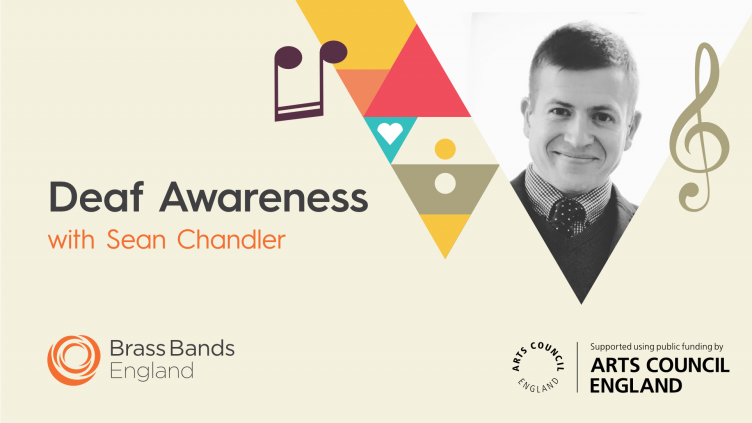
Ahead of his free BBE Deaf Awareness webinar on Thursday 7 October, we spoke to Sean Chandler about how you can become more deaf-aware, and how these strategies can ultimately benefit all members of your band. Over to Sean...
I was diagnosed with meningitis when I was three months old, which led to permanent severe deafness in both ears. I was given, and continue to wear, two hearing aids and now use additional assisting hearing technology (Roger pen) when I am in face-to-face or in Zoom meetings.
My experience as a brass player started when I was seven years old. I could hear the brass lessons from the library opposite my classroom. These sounds were louder and clearer than the voices I had to listen to in my lessons!
I can remember starting to have lessons and being taken aback at how easy it was to hear the sounds I was producing. I could follow my teacher’s demonstrations and found it easy to tune in to different articulations and shapes in the melodies, too. As I developed as a player, I was fortunate enough to play with the National Youth Brass Band of Great Britain and various bands and ensembles in the North West.
Fast forward to the present day, I am lucky enough to have performed in some wonderful places as a deaf professional musician. Alongside this, I lead music workshops for deaf children and young people (Music and the Deaf) where I introduce brass playing and promote a positive deaf identity.
Be deaf-aware
I was fortunate enough to have ideal conditions when I was learning to play cornet. The best thing for me was having a teacher who was deaf-aware and able to arrange ideal listening conditions for me in lessons. Having a teacher that was deaf-aware was the most effective assistance any deaf player can ask for. It is well known that any strategies used to help deaf and hard of hearing players will ultimately benefit the hearing (not deaf) players.
Band masters and leaders need to remember that all hearing assisting technology (hearing aids, cochlear implants etc.) are programmed for speech hearing and listening. There are some instances where the technology allows for a music ‘setting’, but these are still very much in development and, as with all settings, do not solve deafness.
Access strategies
Whilst not every modification made to a rehearsal will work for everyone, through a mixture of good acoustics, some use of vibration and using what residual hearing the learner has, deaf and hard of hearing players can, and will, rehearse and perform well in their ensembles.
As a player today, there are some adjustments I need in order to rehearse and perform with a band effectively. Here are just a few of the strategies I use to help me get access to any rehearsal:
-
Visit the band room where we are playing beforehand so that I can listen to the acoustic and get used to the dynamics of the room. It is important to take any usual hearing assisting technology with you for this.
-
Know the pieces that we are rehearsing so that I can listen to the sounds and get used to where my part ‘sits’.
-
If possible, have a small sectional rehearsal before we start. This is so I can tune up with others without time pressures. Intonation is extremely difficult for me, and it is not helpful for anyone when a conductor is struggling to get my section in tune.
Practising with a tuner is great, because I can see which way the tuning is going. However, this does not mean I am in tune with the rest of my section and the band.
-
Regular ‘ear breaks’ from playing. Sensation flooding can cause people to be overwhelmed with the noise and concentration fatigue from focussing too much on a conductor’s instructions. A quick 5 minutes is sometimes needed to re-focus and re-energise.
-
Time from when the band stops playing to the conductor giving instructions. Hearing aids need time to re-adjust to the volume levels in order to provide appropriate amplification from loud band sound to the conductor’s voice.
As well as this, there are some other helpful ways concert venues offer where I can access what is happening around me:
-
Loop systems when conductors are talking to an audience. It is helpful if bands knew whether conductors are given a microphone to speak to the audience in concert. Being able to switch between the loop system with the microphone and playing will be most beneficial.
-
Some places offer pagers which are connected to fire alarms for deaf and hard of hearing visitors. It may be worthwhile investigating this.
So, what's next?
I am pleased to be able to support Brass Bands England in their mission to make banding accessible for everyone. Along with deaf awareness sessions I'll be running online, I will be talking to banders about specific strategies they can utilise in the band room and concert hall to enable access for deaf and hard of hearing players, who are normally marginalised. Do feel free to get in touch with me via the BBE team; I very much look forward to talking to you and supporting your music making to become as inclusive as possible.
Want to find out more? BBE members can access Sean's guide to booking an interpreter, or access our contact form to be put in touch with a specialist for deaf-awareness support.